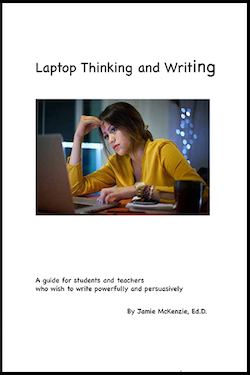Order McKenzie books online with a credit card
Bring Jamie to your school or district for a great workshop
 © iStock.com |
 You can order Laptop Thinking and Writing here |
|---|
 © iStock.com |
This article builds a case for a shift in the job definition of school librarians that will increase their importance, optimize their impact on student learning and require proper funding and staffing. There are nine elements to this shift. Some of the material in this article originally appeared in a keynote presented to the teacher librarians of British Columbia in October of 2010 — "Catching that Fresh Breeze." The keynote struck a nautical theme with the teacher librarian seizing the helm and sailing boldly into the future with firm leadership and great ideas. |
Leader The school librarian helps the principal and the teaching staff to see the wisdom of making information literacy a prime goal of the school.  |
Planner Once the school recognizes the enormity of the shift taking place in the way people learn about the world and communicate, someone has to map out the stages in the campaign. What is the three year plan? Who will take responsibility for the tasks involved? The principal might do this, but it would be best if the teacher librarian were the prime architect of the plan, advising and encouraging the principal to keep things moving forward. |
Researcher Teacher librarians should be exploring future program possibilities and strategies to make sure they are advancing rather than delaying the growth of information skills. Because the information landscape is changing rapidly and dramatically in ways that might enhance the influence and the position of librarians, they will benefit by keeping their eyes on the horizon. It will pay to know what is coming before anyone else in town. Keep an eye on organizations like the Library Futures Institute launched in January of 2021. The coalition includes EveryLibrary, Internet Archive, PublicKnowledge, Readers First, and SPARC, and others. Other groups worth following include Library Futures and the American Libraries magazine. |
Inventor The programs of the previous century will not suffice. The astute teacher librarian will be building new kinds of lessons for teachers as well as for students and their parents to help everyone make sense out of nonsense and resist the cultural drift that undermines independent thought and discovery. A different skill set is needed to navigate the new landscape, but many are unaware of this need. The teacher librarian can alert the school community to the pitfalls, perils and opportunities that confront the earnest learner. |
Designer Few packaged programs will get the job done. In this decade, the teacher librarian can tailor learning to elevate the information literacy skills of everyone in the school community. Design is closely allied with invention. Invention is especially devoted to the origination of a program, while design is about translating that invention into daily lessons and realities. All teachers should be instructional designers, despite the current attempt by some so-called reformers to create teacher proof materials and strategies. Standardization and mechanization work fine in factories and fast food restaurants, but they are unhealthy for children and other living things. |
Critic These are complicated times. Along with some wonderful developments, schools and students are confronted with lots of junk and many program choices that are unhealthy. It takes some courage to question the value of some of these choices. There is often pressure to go along with what is fashionable rather than fighting for what is valuable. The teacher librarian should challenge the fads that reduce quality and divert staff and students from the important work. |
Professional Developer Teachers will need to augment their skill sets to meet the challenges of this new information landscape. There is no one else in the school better suited to help them through this transition than the teacher librarian. It is a wonderful opportunity to support one's peers as they struggle to make sense of what often seems like a jungle. Much of this work can be accomplished in partnership. Peer coaching may be one of the best models. It is not so much abut offering courses and classes as guidance and support. |
Cheer Leader Because the journey will sometimes be painful and awkward, encouragement is essential. Everyone is on the boat, but many do not realize they have been swept up and along with the changes. Moving from denial to acceptance requires quite an emotional adjustment. The teacher librarian can translate the change into something beneficial, thereby winning "take up" rather than resistance. |
Advocate All across North America library programs have been slashed in ways that are unconscionable. How strange that we greet the Information Age by laying off the very people who might help us to adjust to the changes with strength and skill. To reverse this trend, teacher librarians must take the fight to the streets. Members of the community such as business leaders should be recruited to fight for stronger programs. The health of these businesses will depend upon graduates who can make up their own minds, solve problems with ingenuity and manage complexity with self assurance and skill. Along with parents, these community groups can persuade a board of education to restore school library programs to a robust level. But it will not happen unless school librarians act forcefully to mobilize support. |
It may take several years for a school to approach the goal of universal information literacy. The journey requires a substantial and sustained commitment to professional development and program development.
How does a school know when it deserves to be called an information literate school community? When the following characteristics are abundantly evident, the phrase is well deserved . . .
- Invention: Much of the school program is dedicated to problem-solving, decision-making, exploration and the creation of new ideas. Both teachers and students are increasingly engaged in the discovery and building of meaning.
- Fluency: Teachers are becoming more comfortable with the need to move back and forth between an array of instructional roles and strategies. Sometimes they take advantage of efficiencies associated with direct instruction (the sage on the stage). Other times they facilitate more active student participation and inquiry (guide on the side). They are building a toolkit of strategies.
- Support: The school provides ongoing support for all learners to develop thinking and information skills. These opportunities are rich and frequent.
- Navigation: Teachers and students are developing efficient navigation skills. They can find their way through the new information landscape (as well as the old) with little lost time.
- Searching: Teachers and students are sharpening search skills. They apply Boolean Logic. They search with appropriate syntax. They employ powerful search engine features to carve through mountains of information on their way to the most relevant sources.
- Selection: Teachers and students are honing selection skills. They know how to separate the reliable from the unreliable source. They recognize propaganda, bias and distortion.
- Questioning: Teachers and students are extending questioning skills. They know how and when to employ dozens of different types of questions. Some are best to solve a problem. Others help in making a decision or building an answer. Some work best early in the search. Others come into play toward the end.
- Planning: Teachers and students are acquiring additional planning and organizational skills. They sort, sift and store findings to enhance later questioning. They make wise choices from a toolkit of research strategies and resources. They learn when a particular stage in the research process might prove most timely and when a particular strategy might produce the best results.
- Interpretation: Teachers and students are improving in their ability to interpret information. They convert primary sources and raw data into information, and then they proceed further (beyond information) to insight. They translate, infer and apply what they have gathered to the issue at hand. They are skilled at making new meanings. They pass beyond mere consumption of information. They create new knowledge.
- Deep Thinking: Teachers and students combine deep thinking and reading with a wide ranging search for relevant information. This quest for information is but the prelude to the more important work . . . solving a problem, creating a new idea, inventing a product or composing a symphony. Information literacy includes awareness of the limitations of information and the types of thinking required to move beyond those limitations.
- Commitment: All curriculum documents include clear statements regarding the information literacy expectations that are developmentally appropriate for each grade level.
How can we tell that our school is approaching a mature level of information literacy? We assess the Traits of an Information Literate School, rewarding between zero and four stars for each trait according to where our school has progressed on what is for most a five year journey.
• Zero stars = Not an explicit goal. No journey started.
• One star = Starting out on the journey with good intentions.
• Two stars = Making good progress with observable results.
• Three stars = Highly developed and effective
• Four stars = World class. Not much room for growth or improvement.
Note: In the table below, the term "learners" applies to both staff and students.
| Trait |
Description |
|
| Invention | Much of the school program is dedicated to problem-solving, decision-making, exploration and the creation of new ideas. | . |
| Fluency | Teachers are becoming comfortable with the need to move back and forth between an array of instructional roles and strategies. | . |
| Support | The school provides rich and frequent ongoing support for all learners to develop thinking and information skills. | . |
| Navigation | Learners have the navigation skills to find their way through the new information landscape (as well as the old) with little lost time. | . |
| Searching | Learners apply Boolean Logic. They search with appropriate syntax. They employ powerful search engine features to locate pertinent information. | . |
| Selection | Learners know how to separate the reliable from the unreliable source. They recognize propaganda, bias and distortion. | . |
| Questioning | Learners know how and when to employ dozens of different types of questions in the search for understanding and meaning. | . |
| Planning | Learners possess planning and organizational skills. They sort, sift and store findings to enhance later questioning. They make wise choices from a toolkit of research strategies and resources. | . |
| Interpretation | Learners convert primary sources and raw data into information, and then they proceed further (beyond information) to insight. They translate, infer and apply what they have gathered to the issue at hand. | . |
| Deep Thinking | Learners combine deep thinking and reading with a wide ranging search for relevant information. This quest for information is but the prelude to the more important work . . . solving a problem, creating a new idea, inventing a product or composing a symphony. | . |
| Commitment | All curriculum documents include clear statements regarding the information literacy expectations that are developmentally appropriate for each grade level. The school community persists with the literacy goal over time. | . |
|
|
||
Written materials, art work and photography on this site are copyrighted by Jamie McKenzie and other writers, artists and photographers. Written materials on these pages may be distributed and duplicated if unchanged in format and content in hard copy only by school districts and universities provided there is no charge to the recipient. They may also be e-mailed from person to person. All other uses, transmissions and duplications are prohibited unless permission is granted expressly. Showing these pages remotely through frames is not permitted. FNO is applying for formal copyright registration for articles.
Network 609
Denver, CO 80220
Inquiries via email please


